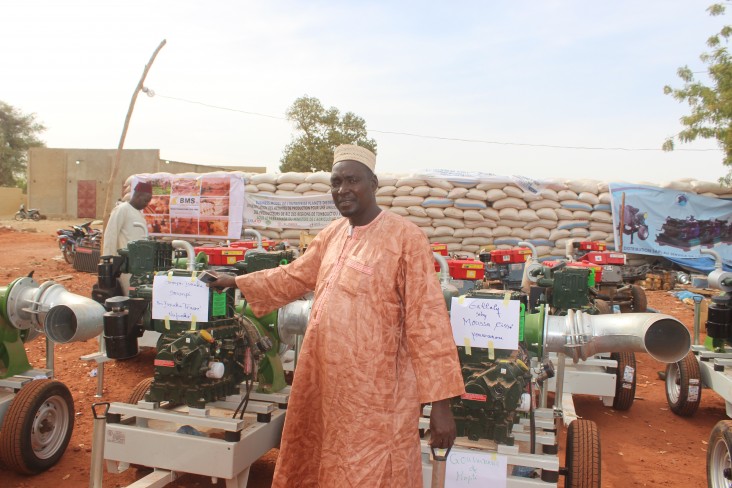Speeches Shim

August 2018 — The security crisis in the northern and central regions of Mali has greatly affected the regions of Mopti and Timbuktu, forcing banks and microfinance institutions to move further south. As a result, agricultural producers in the regions have found themselves without any financial institutions to finance their inputs.
The relocation also resulted in poor credit repayment and producers’ inability to access local bank branches and even their own accounts. In the long term, the conditions could undermine agricultural development. In response, producers of Youwarou and Niafunké districts created the Federation of Union Cooperatives of Youwarou composed of seven unions and 128 cooperatives.
To assist the federation, USAID’s Cereal Value Chain (CVC) project developed a plan to supply agricultural inputs and equipment to producers in areas from Djenne to Timbuktu. The project’s financial intermediaries facilitate access to credit and link private operators and producers. They identified Planète Distribution, a private operator, as willing and able to lend financial resources and agricultural inputs. The company had earlier established an excellent relationship with the project.
Planète Distribution needed to secure raw material supplies for its rice milling operation. It did so by pre-financing agricultural inputs and equipment for well-organized cooperatives and unions in the regions, with repayment in the form of quality rice paddy. Producers get inputs and Planète Distribution gets quality rice paddy for its rice mill.
“Thanks to the CVC project, we supplied all of northern Mali with agricultural inputs and equipment without fear of not being reimbursed and enabling us to supply a contract with the World Food Program for the purchase of nearly 2,200 MT [metric tons] of rice from our rice mill,” said Ousmane Cissé, manager of Planète Distribution.
While Planète Distribution manages the supply of inputs and equipment as well as the milling and sale of rice, the federation coordinates the production activities of the cooperatives. The federation also mediates between the company and cooperatives and coordinates the repayment of credit for inputs and equipment for all project interventions in northern Mali.
Establishing confidence among producers, intermediaries and Planète Distribution enables the timely supply of inputs and equipment — pumps, power tillers, fertilizers and diesel oil — to producers and the prompt repayment with rice paddy following harvest. Repayment terms have been routinely agreed and adhered to, generally without any major problems.
In 2017, Planète Distribution signed 231 contracts with project-supported producer organizations. With each producer organization composed of over 100 members, a total of more than 23,000 producers benefited from agricultural inputs and equipment during the 2017–2018 cropping season. This represents more than $2 million in pre-financing and a success for Malian rice producers that would not be possible without the combined forces of the USAID project, its financial intermediaries, and Planète Distribution.
The five-year USAID Cereal Value Chain project is part of the U.S. Government’s global hunger and food security initiative, Feed the Future. The program, which began in 2014, covers the Sikasso, Mopti and Timbuktu regions and has helped more than 50,000 farmers apply modern technologies and management practices.
LINKS
Follow @USAIDMali, on Facebook

Comment
Make a general inquiry or suggest an improvement.